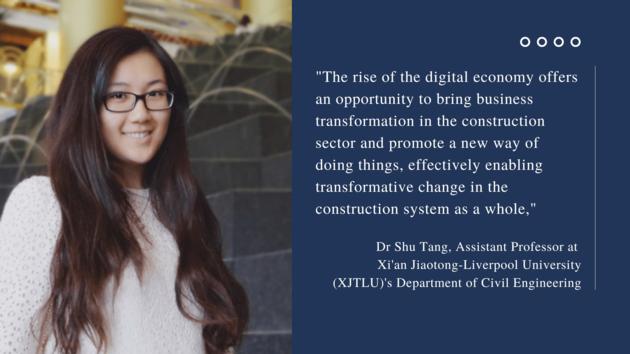Advertisements



Interview: Digitalisation in Construction Industry Facilitates Data-driven Decisions to Reduce Envir
| Price: | US$ 1 |
|---|---|
| Minimum Order: | |
| Payment Terms: | T/T |
| Port of Export: |
Product Details
| Model No.: | Brand Name: |
|---|
| Certification: | |
|---|---|
| Specification: | Dr. Tang is in charge of research on low-carbon operation strategies in the green building industry based on big data under an MoU signed between Glodon and XJTLU. |
Packaging & Delivery
| Packaging: | |
|---|---|
| Delivery/Lead Time: | |
| Production Capacity: |
Product Description
"The rise of the digital economy offers an opportunity to bring business transformation in the construction sector and promote a new way of doing things, effectively enabling transformative change in the construction system as a whole," said Dr. Shu Tang, assistant professor at Xi'an Jiaotong-Liverpool University (XJTLU)'s Department of Civil Engineering, during a recent interview with Glodon.
Dr. Tang is in charge of research on low-carbon operation strategies in the green building industry based on big data under an MoU signed between Glodon and XJTLU. She added that the construction industry's inevitable progression trend includes green concepts and intelligent means.
What follows are highlights of Dr. Tang's answer to the interview, edited and condensed for clarity.
Green Building and the Impact of Digitalisation on the Environment
The construction industry is known as a significant contributor to carbon dioxide emissions because it consumes a sizable amount of global energy. The construction industry consumes more than 40% of the world's energy and emits one-third of all greenhouse gases, other environmental impacts of the building industry are wide. Green building has gained substantial support as a panacea for minimising the environmental impacts of buildings to achieve sustainable development.
The primary benefits of green building are known to include enhanced human health and well-being, environmental protection, increased profitability, and energy efficiency. Green building demands the integration of green technologies and interactions among other building components to achieve sustainability goals. It is evident that the application of green technologies can contribute to sustainable development.
For instance, in southern California, the application of efficient water heating, energy-efficient HVAC systems, the introduction of daylight, optimisation of building orientation and configuration, insulation, and application of passive solar have helped designers to achieve a 59% reduction in building energy consumption.
Digital technology adoption promotes the quality and efficiency of information acquisition in the project network. Existing research indicates that a digital construction framework incorporating BIM, three-dimensional (3D) laser scanning, and other technologies help to optimise the efficiency of the renovation project process by 15% and helps to shorten the duration by two months, with cost savings of 7.41%.
It also facilitates data computation and analysis, which assists stakeholders in making rational decisions.
At the same time, digital technology adoption reduces potential uncertainty-related environmental management and positively affects environmental performance. By supporting sustainable design and construction with digital technologies, firms can accurately create detailed production planning and control workflows to maximise the efficiency of resource utilisation and minimise resource waste.
For example, radio frequency identification (RFID) is used to record waste tracking information and to direct waste to the appropriate facility for reuse. In recent years, green BIM was developed, which includes three R functions, i.e., reduce, reuse, and recycle.
In particular, digital twins, big data, and IoT are a perfect combination that can be applied to green building scenarios for energy efficiency. A big data original approach becomes necessary to process large volumes and varieties of both real-time and historical data to extract meaningful information in order to make data-driven decisions.
Four Main Barriers to Digitalisation
The introduction of digital technologies generally contributes to disruptive innovation, but four main barriers should be highlighted in the construction industry.
First, the cost can be a major barrier, which could be a significant amount of time, effort, and money. But applications might still come about if the benefits are apparent and properly understood.
Second, adopting digitalisation in the AEC industry requires the embracement of change and re-engineering of processes. However, the mechanism that explains how adopting digital technologies leads to performance outcomes in construction projects is still under investigation.
Third, the lack of information needs to be considered. It would be difficult to persuade stakeholders, who are not knowledgeable and feel they do not have the adequate and right information, to adopt digitalisation practices and technologies.
Finally, the success of implementing digital construction greatly depends on the type of contract adopted to deliver the project. Not being able to determine the potential performance of digitalisation technologies, the need to change site behaviors and practices, and the usage of different procurement and contract forms of project delivery suggest that stakeholders would have to adopt new technologies and practices in the face of uncertainties and risks. This often reduces the efficiency of digital technology and may push stakeholders back to conventional construction methods.
Glodon and Other Digital Enablers' Role in Digital Transformation
Companies need to collect more empirical data to validate the effects of digital technology adoption on economic outcomes, social performance, and environmental performance.
Such companies can also provide more expert training for managers and staff. It is well known that the adoption of digitalisation technologies is directly affected by support from top management. As the application of digitalisation technologies and practices can sometimes bring trouble to the entire construction process, it is necessary to ensure that all project participants are competent and technically trained to effectively handle the complexities and relevant digitalisation considerations involved in the project.
It is also necessary for digital enablers to bridge the industry and maintain adequate communication within the sector. The lack of interest and communication among members may also affect the adoption of digitalisation technologies and practices.
Prepare the Future Workforce with Industry-University Cooperation
There is an increasing demand for highly qualified professionals in digitalisation, automation, and globalisation in the construction industry.
AEC companies ought to establish digitalisation roadmaps and methodologies that place employee education and training first. They should develop a digitalisation-skilled workforce who could smartly embrace interdisciplinary teamworking, agile development, new thinking ways, and 'big dataset' exploration. One best way to achieve this is to use in-house capacity-building programs rather than external programs to train employees, as the latter may not afford the holistic company-specific education/training necessary to drive rapid scaling, agile and cross-functional collaboration, and deep/lasting cultural changes.
Universities play an essential role in preparing human resources for the industry of the future. By providing the proper knowledge, they can ensure that graduates can adapt to the ever-changing industrial sector. But to achieve this, the courses provided by academia must cover the current and future industrial needs. Companies could offer practical opportunities for universities as external partners and provide feedback on actual knowledge demands of technologies, and then universities can upgrade their curricula.
We provide digital transformation in construction, digital construction, digital construction software, rebar takeoff software, etc. For more information, please feel free to contact us!

|
SUPPLIER PROFILE
|
|||
|---|---|---|---|
| Company: | Glodon Company Limited | ||
| City/State | Beijing, | Country: |
China 
|
| Business Type: | Export - Manufacturer / Trading Company | Established: | NA |
| Member Since: | 2024 | Contact Person | Glo don |
SUPPLIER PROFILE
City/State/Country -
Beijing,
China 

Business Type -
Export - Manufacturer / Trading Company
Established -
NA
Member Since -
2024
Contact Person -
Glo don



